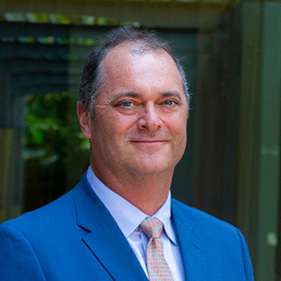UC Davis MIND Institute offers specialized COVID and flu vaccine clinic
Clinic is designed for individuals with autism and other neurodevelopmental disabilities
Starting this month, the UC Davis MIND Institute is offering a new seasonal clinic for both COVID-19 vaccines and flu vaccines for individuals with autism and other neurodevelopmental disabilities.
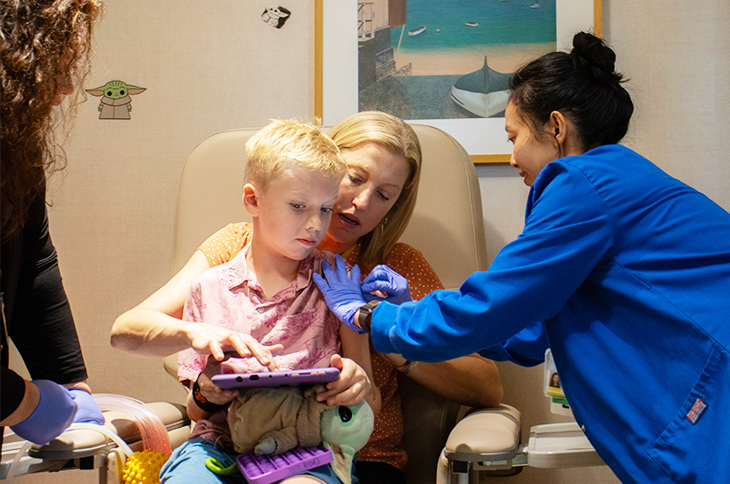
Getting a shot can be a stressful experience for people with these conditions, who may have anxiety and sensory challenges. At the MIND Institute clinic, the vaccines are delivered in a sensory-friendly environment where each patient receives individualized care from specially trained providers and child life specialists.
COVID-19 and flu vaccine clinic
Who: Individuals with neurodevelopmental conditions
Where: UC Davis MIND Institute, 2825 50th St., Sacramento, 95817
When: Fridays, starting Oct. 6, from 9:30 a.m.-4:00 p.m.
You do not need to be a UC Davis Health patient.
Call 916-703-5555 to make an appointment; no walk-ins allowed.
“We are focused on creating a safe, comfortable experience,” said Scott Akins, director of developmental-behavioral pediatrics at UC Davis Health and medical director of the MIND Institute. “We recognize that neurodivergent kids may have different needs and our goal is to meet them where they are.”
The clinic, called the PATH Vaccination Clinic, is part of a two-year project funded by Children’s Miracle Network at UC Davis. It’s aimed at improving health care experiences for neurodivergent individuals and their families. PATH stands for Promoting Accessibility to Healthcare.
The clinic started this month and is held on Fridays, from 9:30 a.m.-4:00 p.m. It will run through Jan. 12, 2024, at the Massie Family Clinic at the MIND Institute. You do not need to be a UC Davis patient to be vaccinated at the clinic.
Appointments must be made in advance, by calling 916-703-5555. Walk-ins are not allowed, because the child life team reaches out ahead of time to each family to help prepare them for the visit.
We are focused on creating a safe, comfortable experience. We recognize that neurodivergent kids may have different needs and our goal is to meet them where they are.” —Scott Akins, director of developmental-behavioral pediatrics and medical director of the MIND Institute
“We call each family prior to their visit to find out how we can meet the individual’s needs and to ask about their interests. We work with them to design a coping plan and share information about what to expect during their visit so there are no surprises,” explained Erin Roseborough, a child life specialist who works at the clinic. “We have also developed materials that give patients a step-by-step description, including images, of what to expect at each stage of the appointment.”
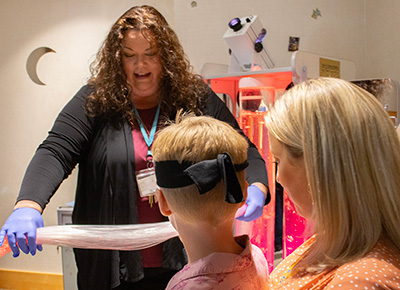
The clinic will offer the 2023-2024 Moderna vaccine which was recently approved by the Food and Drug Administration for emergency use and recommended by the Centers for Disease Control and Prevention (CDC). The monovalent (single) component vaccine protects against the Omicron variant XBB.1.5, sometimes called “Kraken”.
Patients can also get a seasonal flu shot, which the CDC recommends for most people ages 6 months and older each year. You may consider the convenience of getting both the COVID and flu shots in one appointment.
Building on previous vaccine clinic success
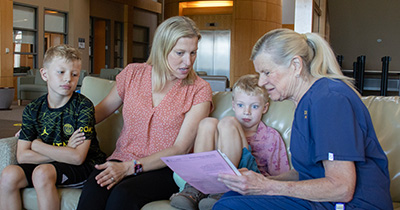
This is the second year for the vaccine clinic. Last year, thanks to funding from the CDC, the MIND Institute offered COVID-19 vaccinations; this year, they’ve been able to expand to flu shots, too.
“The vaccine clinic was really a triumph last year, and we are looking forward to using what we learned to offer both COVID and flu shots this year,” said Katharine Harlan Owens, a program manager at the Center for Excellence in Developmental Disabilities at the MIND Institute. She notes that many families who had positive experiences last year asked for flu shots to be added.
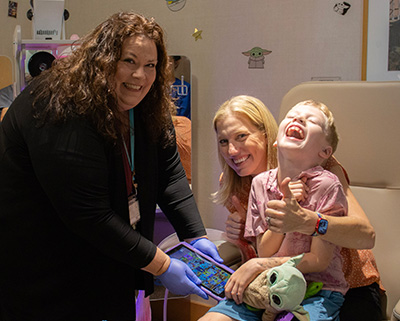
“We vaccinated over 330 neurodivergent individuals and had a 99% success rate in completing the vaccine process. A lot of that was a result of simple accommodations such as giving families more preparation and more time,” Harlan Owens added.
Akins notes that accommodations like these can affect much more than the single vaccine appointment.
“These strategies can really help to break the cycle of avoiding care that some neurodivergent individuals and family members are caught in. They may have had negative experiences with medical care in the past, especially with shots, and this positive experience at our clinic can help to change that. Over time, that can reduce medical trauma and increase participation in recommended care.”
Related stories:
The UC Davis MIND Institute in Sacramento, Calif. is a unique, interdisciplinary research, clinical, and education center committed to deepening scientific understanding of autism and other neurodevelopmental conditions. It is a highly collaborative center, bringing together families, researchers, clinicians, community leaders and volunteers with the common goal of developing more personalized, equitable, and scientifically proven systems of support and intervention. The institute has major research efforts in autism, fragile X syndrome, chromosome 22q11.2 deletion syndrome, attention-deficit/hyperactivity disorder (ADHD) and Down syndrome. More information about the institute and its Distinguished Lecturer Series, including previous presentations in this series, is available on the Web at mindinstitute.ucdavis.edu.

